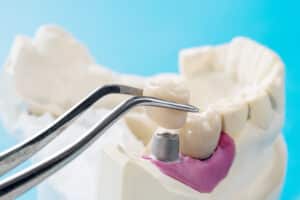
Why You Should Replace Missing Teeth
The American College of Prosthodontists reports that 178 million Americans have lost at least one tooth, and 40 million have no remaining teeth. Additional data from the National Institute of Dental and Craniofacial Research reveals that among adults 20 to 64, 2.2% are missing all of their teeth.
When a person loses teeth, their jaw loses support. Teeth stimulate the upper and lower jawbones through chewing (mastication). Without teeth to provide this stimulation, the bones gradually begin to weaken through a process called resorption. Jawbone loss can lead to:
- Speech difficulties
- Poor lip support
- Problems chewing and swallowing food
- Sinus expansion
- Facial collapse
- Excessive facial skin wrinkling
- Thinning of the lips
Patients with missing teeth also have a higher risk of developing gum disease. The natural recession of the gum line as people age allows for more bacteria to enter the exposed tooth sockets, increasing the risk of inflammation and infection.
Tooth Replacement Options
Working with a skilled restorative dental specialist like Dr. Louisa Gallegos is the best way to find the right treatment. In addition to considering factors like budget and aesthetics, she can also provide the most supportive long-term care. Analyzing the face and jaw is important to determine the extent of bone loss and which treatments would be most effective for your ongoing oral health.
Potential restorative options for missing teeth are:
- Dental implants. These prostheses are permanent solutions that can stop jaw deterioration from lost teeth. The implant is a titanium screw topped with a realistic-looking crown.
- Dental bridges. Bridges use implants or natural teeth to cover gaps from one or more teeth with artificial ones.
- Partial or full dentures. Dentures are a good option for some patients who cannot afford or do not currently qualify for implants or bridges; those who have lost close to or all of their teeth can use full dentures to restore their speech and eating abilities.
How Long Does Tooth Replacement Take?
The extent of treatment depends on the amount of teeth that need to be replaced and the treatment a patient chooses. Some patients may decide to receive implants, but they could also require bone grafting to prepare their jaw for the procedure. In this case, the total length of treatment could take six months to a year. Other treatment options, like dentures or bridges, can be done in a few sessions.
Dr. Gallegos helps every patient find the right solution based on their needs, goals, budget, and preferences.
Start Planning Your Smile Restoration
Dr. Louisa Gallegos is a highly skilled and dedicated prosthodontist. She is the first woman to have ever been accepted into the University of Washington School of Dentistry Fixed Prosthodontic program and has proudly served patients throughout the Denver area for decades.
To arrange an appointment, please visit our contact page or call our office in Denver, CO, at 303-316-4034. The team is always here to help! We look forward to discussing your options with you.
